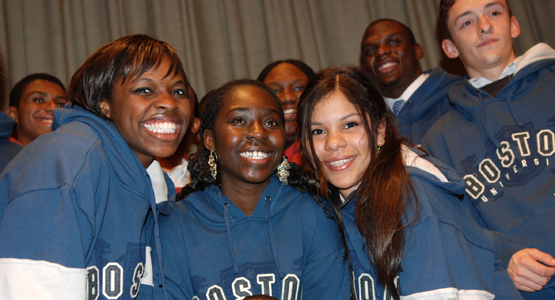Posse Foundation Students Selected for Class of 2012
BU partners with Atlanta schools to help urban youth succeed in college

On Tuesday, December 11, on stage in an auditorium in the Georgia Pacific building in downtown Atlanta, 12 inner-city high school seniors — the newest members of the class of 2012 — wriggled into Boston University sweatshirts.
The ceremony marked the launch of a partnership between BU and the Posse Foundation, a national nonprofit program that recruits and trains groups of talented, leadership-oriented urban high-school students for life at colleges and universities around the country. Members of the posses, as they’re called, mostly come from the same public school system. The idea is simple: send a small team of like-minded kids from similar backgrounds to campus and they can “back each other up” in what can be a bewildering new world.
“Posse has a tremendous track record,”says Laurie Pohl, the vice president for enrollment and student affairs at BU. “Posse kids graduate from some of the best schools in the country, at greater than 90 percent, well above the national average for students from any population.”
The Posse Foundation is the brainchild of Deborah Bial, an education strategist and MacArthur Foundation genius grant recipient. In the late 1980s, Bial became alarmed by the number of inner-city kids quitting college — often intelligent, talented students who felt culturally and racially isolated at school. One told Bial at the time, “I never would have dropped out if I had my posse with me.” Since 1989, the Posse Foundation has placed 1,850 students in top-tier institutions, representing more than $175 million in scholarships.
Pohl and several representatives from BU admissions flew to Atlanta to join the students and their families, friends, guidance counselors, and principals for the awards banquet. The previous week, they’d finalized the team of 12 scholars, some of them the first in their families to attend college. The selection process involves a comprehensive assessment tool developed by the Posse Foundation, as well as interviews conducted by administrators from the participating university.
“These students are highly accomplished,” Pohl says,“but they’re in high school environments where the opportunities just aren’t available to really challenge and push them. If you look at their test scores, they’re going to be flying below the radar of selective institutions.”
Jamal Rasheed, a senior at W. D. Mohammed High School in east Atlanta, says his SATs were merely average and didn’t accurately reflect who he was.
“That’s the thing about Posse,” says Rasheed, who plans to pursue electrical engineering and art at BU and wants to get involved in baseball, soccer, and community service. “They see the person, not a bunch of test scores.”
Rasheed and the other BU-bound students represent one of two inaugural posses from Atlanta. The second group is bound for the College of Wooster in Ohio. The Posse Foundation also recruits students in Boston, New York, Chicago, Los Angeles, and Washington, D.C.
“We just opened our doors in June,” says Charisse Williams, director of Posse Atlanta. “And we received more than 500 nominations from Atlanta public schools and two dozen community-based organizations.”
An intense eight-month training program, beginning in January, will prepare the Posse scholars for campus life and strengthen their bond. They will take part in workshops that focus on team-building, cross-cultural communication, leadership, and academic excellence. Once on campus, the posse will meet regularly with a university mentor.
Shaylithia Copeland, born and raised in downtown Atlanta, is a senior from Carver High School. She says she thinks having backup from her peers will make adjusting to a new city and school environment less daunting, allowing her to focus on academic opportunities.
“BU is a big school and having a posse with you makes all the difference,” she says. “For a lot of kids, when they’re pulled away from their friends and family and don’t have that same support structure anymore, it can feel like, ‘Maybe I need to be at home where everybody else is.”’
Posse’s long-term goal is to create leaders to represent America’s robust multicultural urban centers and help find solutions to complex social problems. As a group, minorities are increasing faster than the nonminority population — the self-identified Hispanic population accounted for almost half of a 2.9 million person boom between 2005 and 2006 — and currently represent one-third of the country’s population, according to the U.S. Census Bureau.
Pohl says the Posse program fits with other BU efforts to enhance diversity on campus. BU plans to take a posse every fall.
“These students really have some amazing stories, not only what they’ve overcome, but what they’ve accomplished,” Pohl says. “But this is what BU is all about, providing access to the highest quality education.”
Caleb Daniloff can be reached at cdanilof@bu.edu.
Comments & Discussion
Boston University moderates comments to facilitate an informed, substantive, civil conversation. Abusive, profane, self-promotional, misleading, incoherent or off-topic comments will be rejected. Moderators are staffed during regular business hours (EST) and can only accept comments written in English. Statistics or facts must include a citation or a link to the citation.